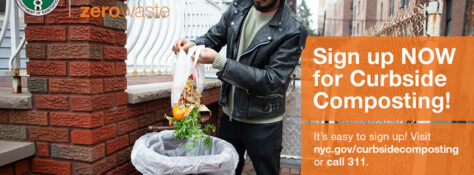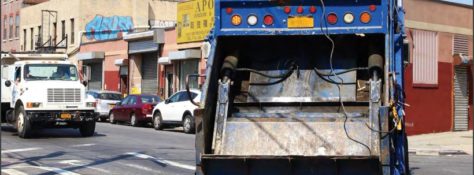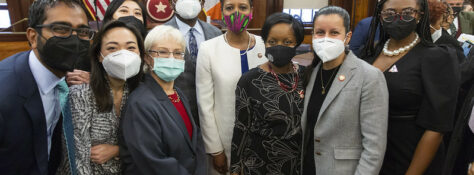Nearly one third of the waste New Yorkers produce is organic material. When this material ends up in landfills, it releases methane, a greenhouse gas 30 times more potent than carbon dioxide. Through an organized composting process, this food waste would be collected, broken down, and recycled into fertilizer for plants and farms. According to an estimate from the New York State Department of Environmental Conservation, eliminating food waste across the state would remove 120,000 metric tons of carbon dioxide equivalents from the atmosphere per year. That’s the equivalent of taking over 25,000 cars off the road.
Learn MoreIn the last week, the City Council Committees on Sanitation and Transportation held hearings on clean streets and expanding vital sanitation services, and transportation equity respectively. The Sanitation Committee’s hearing covered key issues facing the New York region including eco-friendly waste management systems and composting programs, while the Transportation Committee’s forum addressed transportation infrastructure and traffic enforcement initiatives. At both of these hearings, NYLCV New York City Program Associate Carlos Castell Croke testified in support of expanding the city’s composting program as well as making transportation more equitable.
Learn MoreNew York City residents produce nearly 13,000 tons of waste every single day. 81% of this waste ends up in landfills and incinerators throughout the Northeast region. As the garbage decomposes, it releases methane, a greenhouse gas 30 times more potent than carbon dioxide. The diesel trucks that transport this waste carry it a distance equivalent to driving more than 312 times around the Earth. To combat these impacts, New York City has been working toward achieving their Zero Waste goal of eliminating all waste sent to landfills by 2030. This goal requires the reduction in volume of disposed goods, as well as the recovery and reuse of their materials.
Learn MoreLate last week City Council Speaker Adrienne Adams announced her appointees for committee chairs. The most important chairs to keep an eye on for sustainability, and building a greener city, are those for environmental protection, transportation, parks, sanitation, and resiliency. Housing, health, and finance are also important chairs that can help facilitate environmental legislation.
Learn MoreAs New York City begins strategizing for the new year, our new administration and Council Members have the opportunity to start making transformative investments in our environmental infrastructure and resiliency. NYLCV’s newest Policy Agenda lists what issues should be made top priority in the transportation, energy, public health, conservation, and environmental justice sectors, and highlights the legislative opportunities that will get us there. We hope to build upon our progress made last year and continue making bold policy decisions for the good of our community. Below are some of the main points made in this year’s Policy Agenda.
Learn MoreEvery day, almost 100 million plastic utensils are discarded across the United States. The cost to dispose of single-use food ware in a single year is estimated at about 1 billion dollars. Despite these shocking numbers, many restaurants still give out disposable cutlery with every take-out and delivery order. Intro 1775-B is a bill that would require food establishments to only provide non-reusable utensils, condiments, and napkins upon request. While similar bills have been successfully passed in major cities such as Los Angeles, the New York City Council has yet to even have a council hearing concerning this bill. The New York League of Conservation Voters supports the passage of Intro 1775-B to reduce the city’s residential waste.
Learn MoreNews
The NYC Department of Sanitation will resume its program to collect residential organic waste. Residents must sign up to request the service, either through an online form or by calling 311.
Learn MoreNews
The New York City Council last week passed legislation to restrict food-service establishments from giving out single-use plastic straws, except upon request. This will cut the city’s plastic output that reaches our landfills and oceans.
Learn More




